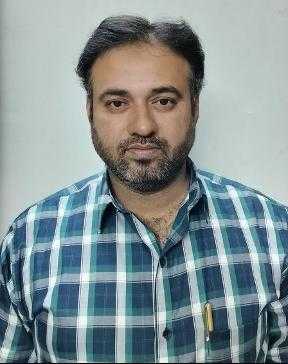
Expert Physiotherapy at Home
Certified physiotherapists visit you at home to provide focused, one-on-one care tailored to your needs. With no travel or waiting rooms, recovery happens in a setting that is comfortable, familiar, and built around your convenience.
Personalised Recovery Programmes
Every treatment plan is designed to suit your condition, goals, and pace. Our physiotherapists follow structured, evolving protocols to ensure consistent progress, with each session aligned to deliver meaningful results.
Trusted Physiotherapists. Real Results.
Our team comprises experienced, background-verified physiotherapists trusted by thousands of families. With a strong focus on safety, reliability, and clinical outcomes, we make recovery at home both effective and reassuring
Patient Testimonials
Portea Physiotherapists for Home Visits
Meet some of our experienced and dedicated healthcare professionals

Dr. Lokesh G
Physiotherapist
Specializations
Experienced in Neurological rehabilitation, Orthopaedic physiotherapy, and Paediatric care
Delivers structured, high-impact treatment plans across neuro, ortho, and paediatrics—ensuring safety, comfort, and measurable recovery at every stage.

Dr. Mohammed Sarwar
Physiotherapist
Specializations
Experienced in Neurological rehabilitation, Adult physiotherapy, and Paediatric care
Combines deep clinical expertise with a compassionate approach, supporting both adults and children through neuro and physical rehabilitation that promotes long-term independence and recovery.

Dr. Nelapati Divya
Physiotherapist
Specializations
Skilled in Orthopaedic rehabilitation, Manual therapy techniques, and Paediatric physiotherapy
Brings a personalised, hands-on approach to healing—combining structural expertise with paediatric sensitivity to restore movement, relieve pain, and improve everyday function.

Dr. Naveen V
Physiotherapist
Specializations
Trained in Pain management, Cardiac and Orthopaedic rehabilitation, Neurological care, and Neural tissue mobilisation
Brings clinical precision and empathy together—designing science-backed recovery protocols for pain relief, nerve mobilisation, and cardio-neuro-ortho rehabilitation across all age groups

Dr. Miloni Savla
Physiotherapist
Specializations
Holds an MPT in Orthopaedics with a focus on Musculoskeletal rehabilitation and strength recovery
Delivers focused, movement-oriented therapy grounded in orthopaedic science—helping patients rebuild strength, restore function, and return to daily life with confidence
Other Cities
Physiotherapy Treatments

what are the common symptoms of myofascial pain syndrome?
MPS presents as deep, aching muscle pain that persists or worsens over time. The primary feature is the presence of trigger points—tight, sensitive knots in muscles that cause referred pain. Commonly affected muscles include the trapezius, rhomboids, and gluteal muscles. Patients often experience muscle stiffness, reduced range of motion, and fatigue. Pain may worsen with stress, activity, or poor posture, leading to discomfort in the neck, shoulders, and lower back.
what are the common causes of myofascial pain syndrome in adults?
MPS is typically caused by muscle overuse, trauma, or prolonged muscle tension. Repetitive stress, poor posture, and lack of physical activity contribute to its development. Other factors, such as psychological stress, sleep disturbances, and nutritional deficiencies, may worsen symptoms. Muscle imbalances and joint dysfunction can also trigger chronic muscle tightness and pain.
what are the risk factors contributing to myofascial pain syndrome?
Individuals with sedentary lifestyles, repetitive occupational tasks, or high stress levels are at greater risk. Poor posture, previous muscle injuries, and underlying conditions such as fibromyalgia increase the likelihood of developing MPS. Those who engage in strenuous physical activity without proper recovery may also experience persistent muscle pain.
how to prevent and manage myofascial pain syndrome effectively?
Maintaining good posture, engaging in regular stretching, and practicing relaxation techniques help prevent MPS. Strengthening weak muscles and avoiding prolonged static positions can reduce tension. Adequate hydration, balanced nutrition, and proper ergonomic setups in workspaces also play a role in preventing muscle dysfunction.
how to diagnose and treat myofascial pain syndrome?
Diagnosis involves clinical evaluation, identifying trigger points, and ruling out other conditions through imaging or electromyography (EMG). Treatment focuses on pain relief and muscle rehabilitation. Common approaches include dry needling, massage therapy, and medication for pain control. Heat therapy, stretching, and lifestyle modifications help manage symptoms and prevent recurrence.
best physiotherapy techniques for myofascial pain syndrome relief
Physiotherapy is highly effective in MPS management. Myofascial release therapy, soft tissue mobilization, and trigger point therapy help reduce muscle tightness and pain. Strengthening and stretching exercises improve muscle balance and flexibility. Postural correction techniques prevent further muscle stress, ensuring long-term relief.
how home-based physiotherapy by portea helps manage myofascial pain syndrome?
At Portea, we understand the challenges of living with Myofascial Pain Syndrome. Our home-based physiotherapy services are tailored to the specific needs of each individual, providing personalized care to help them regain mobility and independence in a safe and supportive environment.
We also specialize in providing expert physiotherapy services for post-surgical rehab, arthritis, neuro-rehab, sports injury, orthopedic physiotherapy, physiotherapy for the elderly, for respiratory disorders, and more – all delivered conveniently at your home. Our dedicated team ensures you receive the personalized care you need for a smooth and successful recovery.
faqs
1. What triggers Myofascial Pain Syndrome flare-ups?
Flare-ups can be triggered by physical overuse, emotional stress, poor posture, or cold temperatures. Inadequate rest, dehydration, and nutritional imbalances may also exacerbate symptoms and lead to increased muscle tightness and referred pain.
2. Can Myofascial Pain Syndrome go away on its own?
While mild cases may improve with rest, chronic Myofascial Pain Syndrome usually requires treatment. Without addressing trigger points and muscular imbalances, the condition may persist or worsen over time, impacting daily function and quality of life.
3. Is Myofascial Pain Syndrome related to fibromyalgia?
Both involve muscle pain, but MPS is localized with trigger points, while fibromyalgia causes widespread pain and fatigue. They can coexist, but MPS is often easier to treat with targeted therapies like physiotherapy and trigger point release.
4. How long does recovery from MPS take with physiotherapy?
Recovery varies by individual and severity, but most patients see improvement within a few weeks of consistent physiotherapy. Long-term management may involve posture correction, strength training, and lifestyle adjustments to prevent recurrence.
5. What home remedies can support MPS treatment?
Heat packs, gentle stretching, foam rolling, and ergonomic corrections help relieve muscle tension. Adequate hydration, magnesium-rich foods, and avoiding prolonged sitting or repetitive motions also support healing alongside professional physiotherapy.
Doctor Consultation
Nursing
Physiotherapy
Trained Attendant
Elder Care
Mother & Baby Care
Lab Tests
Medical Equipment
Speciality Pharma
Critical Care




